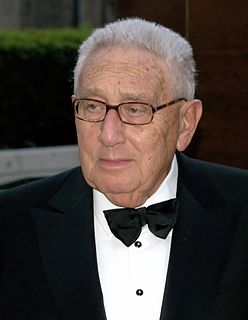
Henry Alfred Kissinger is an American politician, diplomat, and geopolitical consultant who served as United States Secretary of State and National Security Advisor under the presidential administrations of Richard Nixon and Gerald Ford. A Jewish refugee who fled Nazi Germany with his family in 1938, he became National Security Advisor in 1969 and U.S. Secretary of State in 1973. For his actions negotiating a ceasefire in Vietnam, Kissinger received the 1973 Nobel Peace Prize under controversial circumstances, with two members of the committee resigning in protest.

Richard Milhous Nixon was the 37th president of the United States, serving from 1969 to 1974. A member of the Republican Party, Nixon previously served as the 36th vice president from 1953 to 1961, having risen to national prominence as a representative and senator from California. After five years in the White House that saw the conclusion to the U.S. involvement in the Vietnam War, détente with the Soviet Union and China, the first manned moon landings, and the establishment of the Environmental Protection Agency, he became the only president to resign from the office, following the Watergate scandal.
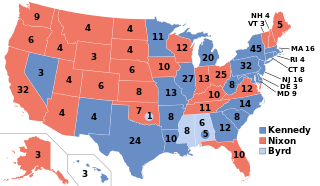
The 1960 United States presidential election was the 44th quadrennial presidential election. It was held on Tuesday, November 8, 1960. In a closely contested election, Democratic United States Senator John F. Kennedy defeated incumbent Vice President Richard Nixon, the Republican Party nominee. This was the first election in which fifty states participated and the last in which the District of Columbia did not, marking the first participation of Alaska and Hawaii. This made it the only presidential election where the threshold for victory was 269 electoral votes. It was also the first election in which an incumbent president was ineligible to run for a third term because of the term limits established by the 22nd Amendment.

The Watergate scandal was a major political scandal in the United States involving the administration of U.S. President Richard Nixon from 1972 to 1974 that led to Nixon's resignation. The scandal stemmed from the Nixon administration's continual attempts to cover up its involvement in the June 17, 1972, break-in of the Democratic National Committee headquarters at the Washington, D.C. Watergate Office Building. After the five perpetrators were arrested, the press and the U.S. Justice Department connected the cash found on them at the time to the Nixon re-election campaign committee. Further investigations, along with revelations during subsequent trials of the burglars, led the U.S. House of Representatives to grant its judiciary committee additional investigation authority to probe into "certain matters within its jurisdiction", and the U.S. Senate to create a special investigative committee. The resulting Senate Watergate hearings were broadcast "gavel-to-gavel" nationwide by PBS and aroused public interest. Witnesses testified that Nixon had approved plans to cover up administration involvement in the break-in, and that there was a voice-activated taping system in the Oval Office. Throughout the investigation, the administration resisted its probes, which led to a constitutional crisis.
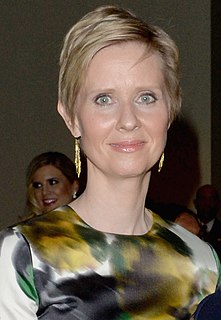
Cynthia Ellen Nixon is an American actress and liberal activist. For her portrayal of Miranda Hobbes in the HBO series Sex and the City (1998–2004), she won the 2004 Primetime Emmy Award for Outstanding Supporting Actress in a Comedy Series. She reprised the role in the films Sex and the City (2008) and Sex and the City 2 (2010). Her other film credits include Amadeus (1984), James White (2015), and playing Emily Dickinson in A Quiet Passion (2016).
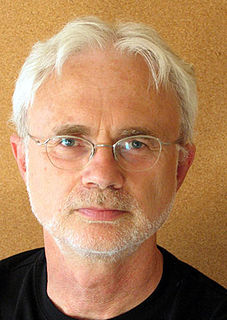
Nixon in China is an opera in three acts by John Adams, with a libretto by Alice Goodman. Adams' first opera, it was inspired by U.S. President Richard Nixon's 1972 visit to China. The work premiered at the Houston Grand Opera on October 22, 1987, in a production by Peter Sellars with choreography by Mark Morris. When Sellars approached Adams with the idea for the opera in 1983, Adams was initially reluctant, but eventually decided that the work could be a study in how myths come to be, and accepted the project. Goodman's libretto was the result of considerable research into Nixon's visit, though she disregarded most sources published after the 1972 trip.

John Daniel Ehrlichman was Counsel and Assistant to the President for Domestic Affairs under President Richard Nixon. Ehrlichman was an important influence on Nixon's domestic policy, coaching him on issues and enlisting his support for environmental initiatives.
Ping-pong diplomacy refers to the exchange of table tennis (ping-pong) players between the United States (US) and People's Republic of China (PRC) in the early 1970s, that began during the 1971 World Table Tennis Championships in Nagoya, Japan as a result of an encounter between players Glenn Cowan and Zhuang Zedong. The event paved the way for President Richard Nixon’s visit to Beijing in 1972 and has been seen as a key turning point in relations between the United States and the People’s Republic of China.
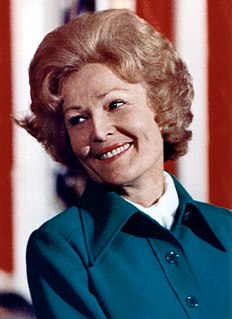
Patricia Ryan Nixon was an American educator and the wife of President Richard Nixon. During her more than 30 years in public life, she served as both the second (1953–1961) and first lady of the United States (1969–1974).
The phrase "Nixon goes to China", "Nixon to China", or "Nixon in China" is a historical reference to United States US President Richard Nixon's 1972 visit to the People's Republic of China, where he met with Chinese Communist Party Chairman Mao Zedong. The metaphor is often expressed as the observation "Only Nixon could go to China" or "It took Nixon to go to China".

Panda diplomacy is the practice of sending giant pandas from China to other countries as a tool of diplomacy.

U.S. President Richard Nixon's 1972 visit to the People's Republic of China (PRC) was an important strategic and diplomatic overture that marked the culmination of the Nixon administration's resumption of harmonious relations between the United States and mainland China after years of diplomatic isolation. The seven-day official visit to three Chinese cities was the first time a U.S. president had visited the PRC; Nixon's arrival in Beijing ended 25 years of no communication or diplomatic ties between the two countries and was the key step in normalizing relations between the U.S. and the PRC. Nixon visited the PRC to gain more leverage over relations with the Soviet Union. The normalization of ties culminated in 1979, when the U.S. established full diplomatic relations with the PRC.

Anna Chennault, born Chan Sheng Mai later spelled Chen Xiangmei, also known as Anna Chan Chennault or Anna Chen Chennault, was a war correspondent and prominent Republican member of the U.S. China Lobby. She was married to American World War II aviator General Claire Chennault.

The 1960 National Convention of the Republican Party of the United States was held in Chicago, Illinois, from July 25 to July 28, 1960, at the International Amphitheatre. It was the 14th and most recent time overall that Chicago hosted the Republican National Convention, more times than any other city.

John Vincent Brennan is a retired United States Marine Corps officer and former political aide. He is best known as being U.S. President Richard Nixon's post-resignation chief of staff.

Richard Nixon's tenure as the 37th president of the United States began with his first inauguration on January 20, 1969, and ended when he resigned on August 9, 1974, in the face of almost certain impeachment and removal from office, the only U.S. president ever to do so. He was succeeded by Gerald Ford, whom he had appointed vice president after Spiro Agnew became embroiled in a separate corruption scandal and was forced to resign. A prominent member of the Republican Party from California, Nixon took office after the 1968 presidential election, in which he defeated incumbent Vice President Hubert Humphrey. Although he had built his reputation as a very active Republican campaigner, Nixon downplayed partisanship in his 1972 landslide reelection.

The first inauguration of Richard Nixon as the 37th president of the United States was held on Monday, January 20, 1969, at the East Portico of the United States Capitol in Washington, D.C. This was the 46th inauguration and marked the commencement of the first and eventually only full term of both Richard Nixon as President and Spiro Agnew as Vice President. Chief Justice Earl Warren administered the presidential oath of office to Nixon, and Senate Minority Leader Everett Dirksen administered the vice-presidential oath to Agnew. Nixon was the first non-incumbent vice president to be inaugurated as president. This was also the last presidential oath administered by Chief Justice Warren.

The so-called "last press conference" of Richard Nixon took place on November 7, 1962, following his loss to Democratic incumbent Pat Brown in the 1962 California gubernatorial election. Appearing before 100 reporters at the Beverly Hilton Hotel, an embittered Nixon lashed out at the media, proclaiming that "you don't have Nixon to kick around any more, because, gentlemen, this is my last press conference."
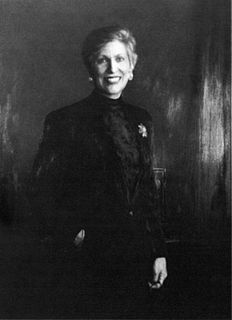
Barbara Hackman Franklin is an American government official, corporate director, and business executive. She served as the 29th U.S. Secretary of Commerce from 1992–1993 to President George H.W. Bush, during which she led a presidential mission to China.
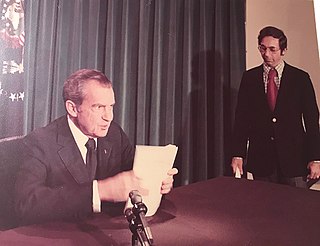
President Richard Nixon made an address to the American public from the Oval Office on August 8, 1974, to announce his resignation from the presidency due to the Watergate scandal.

















